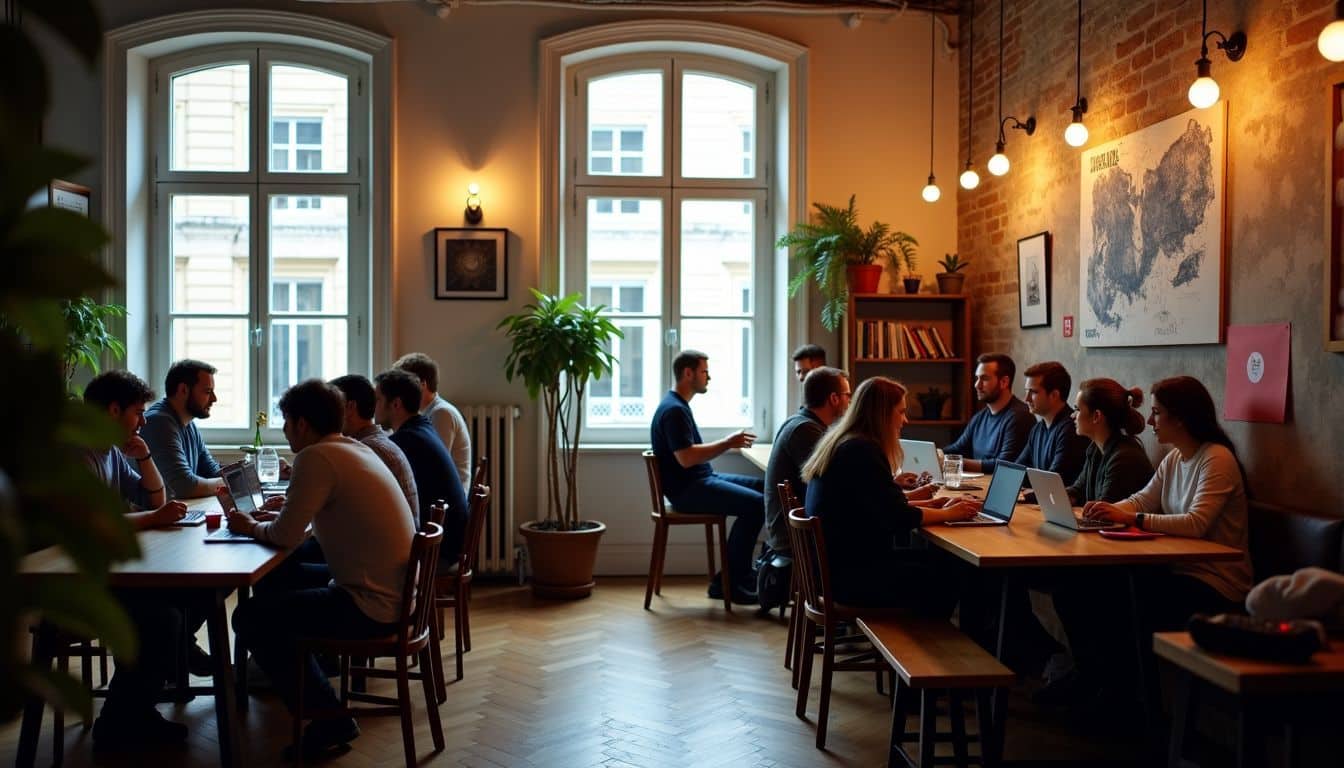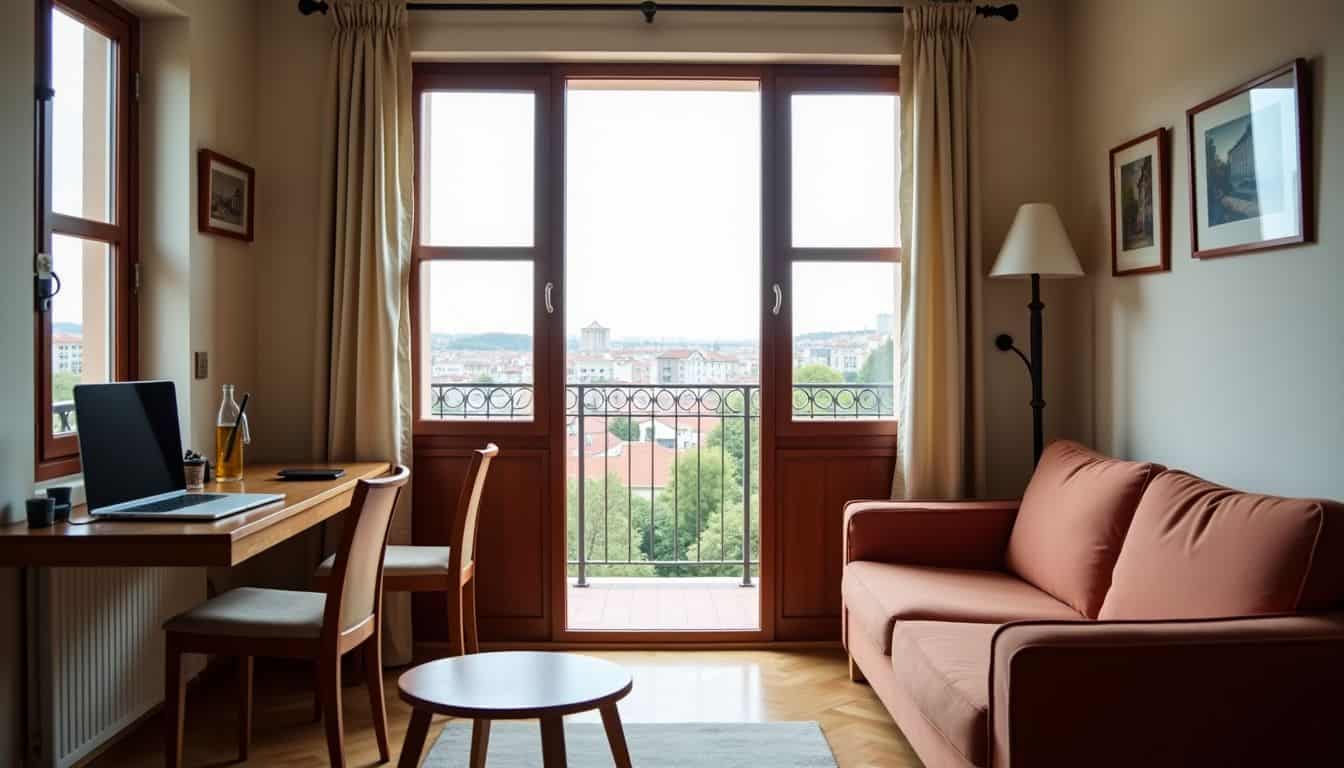Is Portugal good for digital nomads—is it really as perfect as people say? Portugal ranks 17th globally for internet speed, making remote work a breeze. In this post, you’ll discover five Portuguese cities, coworking spaces, and tips to help you choose the best place to live and work.
Keep reading to find your ideal city!
Key Takeaways
Portugal sits at 17th place worldwide for internet speeds—averaging 34.5 Mbps—perfect for remote workers needing steady connections.
Living expenses stay budget-friendly: singles typically spend about $1,423 a month, while families average around $2,833.
The country issues a Digital Nomad Visa (known as D8), asking applicants to prove monthly earnings of €3,280 or more, along with valid health coverage.
Popular cities among digital nomads are Lisbon—with around 300 days of sunshine each year—Porto, offering apartments starting at just €600 per month, as well as Braga, Madeira, and Aveiro.
Coworking spots such as Porto i/o, Largo (about €150 monthly), and Factory Braga have reliable Wi-Fi, plus great opportunities to meet fellow remote professionals.
Table of Contents
Why Portugal is a Popular Choice for Digital Nomads

Portugal has become a hotspot for remote workers who want to mix work with coastal views and old-world charm. The country offers fast internet speeds, low rent prices, and a relaxed lifestyle that draws digital nomads from across the globe.
Affordable Cost of Living

Life in Portugal is affordable—especially compared to other European destinations. For example, a single adult usually spends around $1,423 each month. Families of four typically need about $2,833 monthly.
Basic expenses like food, rent, and transport average roughly $1,700 per month. Rent varies a bit based on area: a furnished 85m² apartment costs about €1,136 monthly in prime city neighborhoods, but only €741 in regular areas.
Digital nomads appreciate these lower prices, which still offer high-quality European comforts.
The rental market gives remote workers plenty of attractive options at reasonable rates. Groceries at local markets are often cheaper than in Western European countries. Eating meals out at restaurants also costs less.
Many remote-workers note saving around 30-40% on daily living expenses compared with pricier cities like London or Paris. Debit cards are widely accepted, but it’s helpful to carry small amounts of cash for smaller cafés and local stores.
Affordable living means fewer financial worries, letting you truly enjoy work and everyday life.
High-Speed Internet Access

Portugal is a great spot for digital nomads who need dependable internet. With average speeds around 34.5 Mbps, the country holds the 17th spot worldwide for its internet quality. You’ll find smooth video calls, quick uploads, and hassle-free work tasks—no slow connections clogging up your day.
Major companies like NOS, Meo, ARTelecom, and NOWO provide steady coverage throughout most city areas. In cafés, restaurants, and public parks around Lisbon or Porto, strong Wi-Fi signals are easy to find.
A solid internet setup makes remote work simple from nearly any place in Portugal. Coworking spaces, especially in Lisbon and Porto, offer business-level connections that easily handle heavy workloads.
They even have backup systems ready, just in case your main connection suddenly drops. Many rented apartments include high-speed Wi-Fi built into your contract, making your moving-in process smoother.
Portugal’s reliable online connections let you freelance comfortably or manage your online business while enjoying a relaxed European lifestyle.
Scenic Landscapes and Mild Climate

Working from Portugal feels like mixing business with vacation—with scenic views that inspire you to open your laptop. Lisbon alone gets around 300 sunny days every year, ideal if you’re tired of gloomy weather.
Take your breaks lounging on Faro Beach’s soft golden sand, or explore lush hiking paths in Peneda-Gerês National Park. Portugal’s mild Mediterranean climate means no bulky jackets packed in your suitcase, and no dealing with extreme temperatures.
Portugal’s landscape is nature’s coworking space – with better views than any office could offer.
Madeira Island and its charming capital, Funchal, offer ocean views guaranteed to lift your mood and boost your workflow. In the colorful city of Aveiro—known as Portugal’s Venice—you can settle in with your laptop right next to postcard-worthy canals.
Lisbon is also close to the dreamy Pena Palace, perfect for a quick weekend escape. Between the pleasant weather and beautiful outdoors, you can grab lunch at sunny cafés almost every day.
Access to European Markets
Portugal hands digital nomads an amazing opportunity to enter Europe’s market. As part of the EU, your business gains easy access to 27 countries without extra paperwork. I launched my online store from Porto, selling products all around Europe without customs headaches.
Plus, the country’s Schengen membership lets you freely visit 26 countries for up to 90 days, ideal for client visits or attending networking events. Even better, Portugal’s Digital Nomad Visa and the D7 Visa make life simple, letting you live legally in the country as you run your remote business and explore fresh markets.
Many remote workers pick Portugal as their European home base because it makes doing business so easy.
Portuguese tax laws sweeten the deal for digital entrepreneurs and freelancers, too. Through the Non-Habitual Resident tax option, your income taxes can shrink significantly for a whole decade.
After moving from the US, my freelance earnings rose 20% easily due to these tax advantages. This favorable EU connection makes Portugal unique from other popular remote worker spots, such as Bali or Thailand.
Now, let’s check out the top five Portuguese cities digital nomads love, and their specific perks.
Digital Nomad Visa in Portugal

Portugal’s Digital Nomad Visa opens doors for remote workers who want to live in this sunny European nation while keeping their foreign income – check out the simple steps to apply and start your Portuguese adventure now.
Eligibility Requirements
Portugal has clear and straightforward requirements for digital nomads planning to live and work there. The D8 Digital Nomad Visa makes remote work easy if you meet the criteria below:
- Income Verification — Show proof you earn at least €3,280 per month. You’ll provide bank statements covering the past three months as evidence.
- Valid Passport — Your passport must remain valid for six months past your intended stay.
- Criminal Record Check — Submit criminal history reports from your home country and any other place you’ve lived longer than one year.
- Health Insurance — Obtain health insurance valid in Portugal, covering medical expenses of at least €30,000.
- Housing Proof — Provide a valid rental agreement, hotel reservation, or a letter from a friend confirming your stay.
- Remote Employment Proof — Supply a formal letter from your employer or client contracts showing you work remotely for companies outside Portugal.
- Portuguese Tax ID (NIF) — Obtain this from a local tax office or through an Entrepreneurial start-up VISA in Portugal.
- Visa Form — Fill in every field; no section of the application can be left blank.
- Biometric Requirement — During your visa interview, you’ll give digital fingerprints and a photo scan.
- Application Costs — The D8 visa application is around €90, and the residence permit will cost approximately €200.
Application Process
Applying for Portugal’s Digital Nomad Visa doesn’t need to stress you out—handling your paperwork carefully from the start will make things go smoothly.
Here’s exactly what you need to do:
- Collect your passport, proof of steady income, valid health insurance, and recent criminal background checks.
- Schedule an appointment online with the nearest Portuguese consulate or embassy.
- Complete the visa application form, clearly listing your personal details and describing your remote job.
- Submit your documents in person and pay the application fee, around €180.
- Go to the consulate interview, answer casual questions about your work situation, and explain your future plans in Portugal.
- Wait around 2–4 weeks, depending on where you’re applying from, for your visa to receive approval.
- Once approved, pick up your visa at the consulate and start preparing for your move.
- After arriving in Portugal, register with the Immigration and Borders Service (SEF) within the first 120 days.
- Pay the €320 fee to receive your residence permit.
- Collect your residence card, valid for up to two years.
- Open an account with a Portuguese bank to easily handle your daily finances there.
- Sign up with local tax authorities if you’re staying over 183 days each year.
Income Thresholds
After completing your visa paperwork, you’ll have to prove you’ve got enough funds to comfortably live in Portugal. Digital nomads face strict income requirements here. To qualify for the Digital Nomad Visa (D8), you must show earnings of at least €3,280 per month.
This figure makes sure you can easily afford housing, food, transportation, and daily living expenses without pressure or worry.
Other types of visas come with different financial rules. For instance—the Temporary Stay Visa requires monthly earnings of €2,800. If your income comes mainly from investments or rental properties rather than active work, the D7 Visa could fit your needs.
That visa sets a lower annual income requirement: just €8,460 per year. Frankly, I was a bit surprised how high some of these financial thresholds were when I relocated to Porto last year—but thankfully, my tech job salary surpassed them easily.
The Portuguese authorities carefully review your financial documents during the visa approval process, so it’s smart to have neat, organized bank statements on hand—this speeds things along nicely.
Best Cities in Portugal for Digital Nomads

Portugal offers five amazing cities that cater to digital nomads with unique perks. Each city has its own charm, from buzzing tech hubs to peaceful coastal retreats.
Lisbon
Lisbon is quickly becoming a favorite among digital nomads—it’s the ideal spot in Portugal for remote work. The city provides speedy internet connections plus plenty of modern co-working spaces popping up around town.
https://www.youtube.com/watch?v=99QGx4-e6k0
In 2024, rental costs dropped 16.5%, meaning apartments here are now cheaper than in most other European capitals. With roughly 300 sunny days each year, you can easily set up at a café terrace or spend afternoons working comfortably in the park.
Lisbon gave me the perfect mix of work-life balance I couldn’t find anywhere else in Europe.
A significant share of Portugal’s 16,000 digital nomads call Lisbon home, creating an instant community for socializing and building connections. Getting around is simple, with reliable transportation and an airport that easily links travelers with major European cities.
English is widely spoken in Lisbon, so new arrivals rarely face any language issues. The city’s old-world charm blends seamlessly with comfortable modern services—ideal for guys aiming to grow their careers, yet still have a good lifestyle in their off-hours.
Porto
Many remote workers head straight to Lisbon, but Porto offers a cheaper option—with plenty of charm of its own. This city in northern Portugal combines traditional appeal with modern perks, ideal for anyone looking to become a digital nomad.
You can find cozy studio apartments in central locations for about €600 per month—far cheaper than what’s typical in Lisbon. In general, your monthly costs as a single person would be roughly $1,250, including housing, groceries, and daily essentials.
Porto also has a lively coworking community worth checking out. Spots like CRU Creative Hub and Synergy Coworking offer reliable internet, along with great chances to meet other remote workers from around the world.
I personally spent three months working out of these spaces, and the mixture of friendly locals and foreigners made it easy to stay productive and build friendships. Getting around town is simple due to Porto’s compact size.
Often, you can reach your destination just by walking or hopping on a quick metro ride.
Braga
Braga is one of Portugal’s oldest cities, blending rich history with plenty of modern comforts—ideal for digital nomads. With a low cost of living around $500 per month, you’ll find it easy to stretch a budget while working remotely.
Gorgeous landmarks like Braga Cathedral and Biscainhos Museum provide an incredible balance between productivity and leisure. Reliable internet connections are common, and coworking spots across the city let you meet fellow remote workers without fuss.
Cozy cafés offering free Wi-Fi and delicious coffee welcome anyone working from their laptops.
Remote workers appreciate Braga’s relaxed pace, a nice change from Lisbon’s hectic vibe, but still enjoy easy access to everything they need. The local economy encourages freelancing and remote positions, and Factory Braga provides excellent coworking facilities.
Public transportation is cheap and efficient, so owning a car isn’t necessary—especially within the city center. Affordable health insurance is also available, and Portugal’s government makes legal residency simple for EU citizens.
Porto is another great—and economical—Portuguese city with its own unique advantages for remote living.
Madeira
Swapping the bustle of Braga for Madeira’s island paradise offers digital nomads a refreshing change of pace. This sunny gem has soared in popularity since the Digital Nomads Madeira Islands project kicked off in February 2021.
Located comfortably within the Schengen area, Madeira blends productivity and leisure perfectly for remote professionals. Affordable housing sweetens the deal, too—long-term stays average around $600 per month, much cheaper than rentals on the mainland.
Reliable internet also makes working a breeze, and coworking spots such as Cowork Funchal and Nomadico provide friendly, modern workspaces.
Meals here are affordable as well. A local restaurant serves tasty dishes for about $8, and you’ll find a wide variety of eateries to explore. Even the Portuguese government pitches in, offering special visa routes aimed at digital nomads interested in living in “Portugal’s Venice”.
Health insurance is a must-have for long stays, but it’s a fair price to pay for sunny island vibes paired with European Union perks. Plenty of apartments feature breathtaking sea views, and mild weather year-round means working outside becomes your daily routine.
Aveiro
Aveiro, known fondly as Portugal’s own Venice, blends charming historic beauty with modern conveniences—ideal for digital nomads. Around 79,000 residents call this city home, creating a cozy yet lively atmosphere.
Last summer, I rented an apartment here and found it much cheaper than places in Lisbon or Porto; monthly expenses totaled around $2,632. Internet speeds averaged 23 Mbps, smoothly handling remote work tasks without hassle.
Plus, local landlords typically speak English, making apartment rentals easier compared to smaller Portuguese towns.
Coworking spaces in Aveiro offer plenty of chances to meet both locals and other traveling professionals. After finishing up for the day, you’ll discover delicious restaurants that won’t hurt your wallet.
Be sure to sample Ovos Moles—a traditional Aveiro dessert made from sweetened egg yolks—it’s worth the indulgence. Travel within Portugal is easy as well, with efficient train services connecting Aveiro and Porto in only 40 minutes.
Thanks to the Schengen visa, quick weekend getaways to other European countries become hassle-free. Mild temperatures make outdoor life enjoyable year-round—I often spent afternoons working at cafés beside canals, enjoying views of brightly painted boats drifting slowly by.
Coworking Spaces in Portugal

Portugal offers amazing workspaces for digital nomads who need a desk and fast Wi-Fi. You’ll find cool spots like Porto i/o and Factory Braga, where you can meet other remote workers while getting your tasks done.
Porto i/o
Porto i/o is a favorite coworking space in downtown Porto, known among digital nomads for its comfort, convenience, and affordable options. Flexible desks cost around €113 per day, while private desks are available at €150 per week—ideal if you want dedicated workspace without long-term commitments.
But there’s more here than just desks and chairs. Fast Wi-Fi lets you connect effortlessly with clients across the European Union, and a handy kitchen helps you save by skipping restaurant meals.
Between tasks, you can relax or chat with fellow remote workers in the cozy chill-out lounge. Digital nomads frequently highlight the prime location—right in the city center—which makes after-work exploring easy, without extra transportation costs.
Liberdade229
Liberdade229 was a top choice for digital nomads in Portugal from 2009 until 2021. This coworking hub sat in a beautiful 19th-century building right on Lisbon’s iconic Avenida da Liberdade.
With seven uniquely styled rooms containing 34 desks, the workspace drew in people—especially those looking for history blended with modern convenience. Workers enjoyed fast Wi-Fi and a prime spot to meet and collaborate with fellow nomads.
Many chose Liberdade229 exactly for its blend of historic atmosphere and practical workspace. Its central location allowed easy travel to and from Lisbon airport, plus quick access to nearby restaurants, cafés, and grocery stores.
Though it shut down in 2021, Liberdade229 defined the ideal experience digital nomads now expect in Portugal—combining local culture, comfort, and genuine connections.
Largo
Largo ranks among Portugal’s best coworking spots for digital nomads. Set inside a sunny, spacious building, it provides reliable high-speed internet—perfect if you’re always on Zoom calls.
I worked from Largo for three months and enjoyed the combination of open desks and private rooms. The setup worked equally well for individual tasks and team meetings.
Monthly membership starts at just €150—a much better deal than comparable coworking hubs elsewhere in Europe. Staff members speak fluent English, which comes in handy if your Portuguese skills aren’t strong yet.
Twice each week, Largo organizes networking events. At these gatherings, I connected with recruiters and other digital nomads. Plenty of locals and expats also frequent the space, especially while waiting for their permanent residency approvals.
The building sits close to affordable apartments and public transit routes, keeping daily commutes quick and easy.
There’s even a community kitchen with a cozy dining space—ideal for casual chats and making professional connections. These informal encounters could lead you to your next job or even a new business partner.
Factory Braga
Factory Braga provides digital nomads with an excellent workspace spread neatly across three spacious floors. This coworking center also hosts a digital marketing academy—ideal for remote workers looking to sharpen their skills.
You can rent meeting rooms without breaking the bank, at only €9 per hour or €70 for an entire day. Last summer, I visited the place myself and enjoyed smooth internet connections, perfect for video chats with clients overseas.
You’ll find Factory Braga conveniently located at Avenida Barros e Soares n 423, right within Braga’s busy business district, close to public transit. Plenty of Portuguese locals and foreign professionals prefer this spot for its modern facilities and friendly networking atmosphere.
Flexible monthly plans make it easy for workers to live affordably in Portugal while using a professional office environment.
Ocupa Cowork
After checking out Factory Braga—let’s shift gears and talk about Ocupa Cowork. This workspace ranks high among digital nomads exploring Portugal. The space feels open and airy, with bright areas and speedy internet, making it easy to stay productive and relaxed.
Monthly membership rates begin at only €80—well below Portugal’s minimum wage—which is great news if you’re freelancing on a tight budget.
Ocupa Cowork sits right in Porto’s lively arts district. Every week, events take place there, bringing local Portuguese residents and foreign remote workers together to mingle and network.
I spent three enjoyable months working at Ocupa and found the setup ideal, with comfortable private desks as well as welcoming common spaces. Another big bonus—they offer essential details about health insurance coverage if you’re arriving on a work visa.
Plus, the kitchen comes stocked with groceries from nearby supermarkets, helping you save cash and effort, leaving more energy for building professional ties.
Networking Opportunities for Digital Nomads

Portugal offers rich networking chances for digital nomads beyond the usual Slack groups and Facebook meetups. You’ll find weekly events in major cities where remote workers share tips on visas, taxes, and the best local spots for both work and play.
Community Events
Digital nomads in Portugal have plenty of opportunities to connect every week. In Lisbon, “Nomad Tuesdays” brings together remote workers to share helpful tips, tasty tapas, and local wine.
Further north in Porto, the “Digital Nomad Coffee Club” gathers weekly on Thursdays, rotating through cozy city cafés. These meetups offer chances to quickly expand your social circle.
People often discover job opportunities, housing recommendations, and even new friends to travel with.
Coworking spaces like Porto i/o and Largo regularly host useful workshops on taxes, leasing apartments, and getting Portuguese ID cards for extended stays. On Madeira Island, the annual “Nomad Summit” attracts hundreds of digital workers every spring.
Online groups, like the active “Digital Nomads Portugal” Facebook community, announce daily meetups for group dinners or scenic beach days. Events like these ease the worry and boost the excitement of moving abroad.
You’ll easily connect with friendly locals, plus fellow remote workers, who can provide practical tips on jobs and apartment hunting.
Online Platforms for Digital Nomads
Several online resources make it easy for men to tap into Portugal’s thriving remote worker community. Nomad List helps you compare Portuguese cities by internet quality, living costs, and overall safety—key details if you’re aiming for legal residence.
Facebook communities like “Digital Nomads Portugal” share helpful advice on apartments, coworking hubs, and local meetups where remote workers gather. Online networks such as Digital Nomad World—with more than 40,000 active members—provide valuable insights about Portuguese citizenship rules and popular co-living neighborhoods.
These sites often include detailed reviews on local transport options and self-employment tax tips within Schengen zone countries.
These digital communities regularly share timely updates, like recent changes in Portugal’s golden visa program or permanent residency card guidelines. Digital Nomad World’s 160 professional advisors are ready to help with job market comparisons between Lisbon and Porto, or clarify your obligations as a foreign renter.
Next, we’ll cover the real costs you’ll likely encounter as a remote worker settling in Portugal.
Cost of Living for Digital Nomads in Portugal

Portugal offers digital nomads a budget-friendly lifestyle with prices far below other European hotspots. Your euros stretch further here, with affordable flats in most cities and cheap transportation options across the country.
Accommodation Costs
Housing costs in Portugal depend heavily on the city and apartment size. In Lisbon, renting a one-bedroom apartment can set you back around €700 to €1,300 each month. Porto, on the other hand, provides similar-sized apartments at slightly cheaper prices—about €700 to €1,090 monthly.
For families or roommates needing extra room, three-bedroom apartments average between €1,200 and €2,400 in Lisbon, or roughly €900 to €2,200 in Porto.
Lots of digital nomads opt for coliving spaces to cut costs and socialize easily. These shared spots usually bundle internet access and utilities into the monthly rent, making budgeting simpler.
I personally landed a Porto apartment at €850 a month using a local tenant group on Facebook. My flat came fully furnished, had reliable amenities, and strong, steady internet. The landlord asked for the first and last month’s rent, along with a copy of my ID—pretty standard stuff.
Unlike some European nations, landlords here don’t typically ask tenants for a criminal background check.
Short-term stays, like hotel rooms, might seem convenient at the start but drain your cash much faster than regular leases. They’re handy as a temporary fix but pricey as a long-term solution.
Transportation Costs
Moving around Portugal is easy—and budget-friendly too. Local transportation costs around €2 for a single trip, or roughly €40 monthly for unlimited rides. Perfect for digital nomads keen on discovering their new hometown.
Taxis are fairly priced at about €0.85 per kilometer, with waiting fees at approximately €15.95 per hour. From my own experience in Lisbon last year—where I stayed three months—these prices seemed entirely reasonable.
Long-distance travel is also wallet-friendly. For instance, a comfortable four-hour bus ride between Lisbon and the stunning Algarve region is just €18. This makes spontaneous weekend trips simple and stress-free.
Portugal’s transportation system conveniently links all the main cities, letting you freely explore the nation while keeping expenses low.
Compared to many other European nations, Portugal’s transit options are especially budget-friendly. Most digital nomads easily cover their entire transportation budget with €100 to €150 per month.
Buses and trains stick to their schedules reliably. Metro systems in bigger cities, such as Lisbon, stay clean, organized, and hassle-free. Plenty of digital nomads skip rental cars altogether, since buses, trams, and metro lines serve their needs without issue.
Saving money on travel means having extra cash for enjoying the incredible local food, culture, and social life Portugal offers.
Food and Grocery Expenses
Once you’ve figured out transportation, next up is tackling groceries and kitchen supplies in Portugal. Luckily, food shopping here stays budget-friendly—most digital nomads spend roughly €335 a month on groceries.
Local markets often provide fresh produce at decent prices, while big supermarkets like Pingo Doce and Continente carry all the essentials. Preparing meals at home helps stretch your money, especially compared to dining out in crowded tourist areas.
Still, eating out is pretty affordable—if you pick the right places. Basic meals in local restaurants usually cost around $7.91, perfect for low-budget lunches. Skip those pricey tourist spots and ask locals about favorite lesser-known eateries.
In many cities, you’ll find laundromats conveniently placed near shopping hubs—great for getting multiple errands done in one outing. Savvy nomads often mix home-cooked meals with occasional restaurant outings, balancing savings and delicious Portuguese food along the way.
Challenges of Living in Portugal as a Digital Nomad

Living in Portugal as a digital nomad comes with real hurdles that might test your patience. Language barriers, slow government offices, and summer crowds can make daily life tougher than expected.
Language Barriers
Portugal thrives on face-to-face interactions—which can be tricky if you don’t know Portuguese. Many digital nomads find basic chores like setting up internet or locating a laundromat challenging without language skills.
Public schools teach exclusively in Portuguese, making it particularly hard for families with kids. You’ll need some basic Portuguese to order food or get directions. Although English is common in major cities and tourist areas, people in smaller towns usually communicate only in Portuguese.
Some expats even hire translators to help with ID card applications or job contracts.
Learning Portuguese can open many doors that remain shut for people who never try. Coworking spaces often offer Portuguese classes as part of their member perks. And here’s some good news: Portuguese shares similarities with Spanish and French, which means speakers of either language usually pick it up quickly.
Apps like Duolingo are effective, but nothing beats chatting with Portugal’s locals. Even small attempts to use the language earn you plenty of respect—and make getting around much simpler.
The language gap shrinks significantly if you make an effort with the local culture.
Bureaucratic Processes
Handling paperwork as a digital nomad in Portugal takes plenty of patience—seriously. Last year, I ran into frustrating conflicts with two government offices: AIMA and Social Security.
One asked for documents, the other clearly told me weren’t necessary. Applying for residency moves incredibly slowly; think long waits just to schedule appointments or get answers.
A lot of nomads have trouble understanding the Social Security office’s rules for applying for the NISS. Officials regularly contradict each other about whether you must get this important identification before you can legally work.
Every European economic area country deals with paperwork issues—but Portugal has its own unique headaches. Getting hired locally means multiple office visits, complicated forms, and confusing steps.
Language barriers don’t help either, since many official documents only come in Portuguese. Plan on extra time for every government process: something you expect to finish in days could easily drag into weeks or even months.
Bringing along a friend fluent in Portuguese to official appointments can protect you from expensive errors that put your visa status or tax duties at risk.
Seasonal Tourist Crowds
Tourists flood into Portugal from June through August each year. Lisbon and Porto become incredibly busy, filling streets, cafés, laundromats, and public transit to capacity. Accommodation costs jump noticeably during these summer months, too.
Last July, I waited three whole hours for a seat at a popular Porto restaurant—but in October, I got served within 15 minutes! The beaches in the Algarve get extremely crowded, and smaller cities like Aveiro—nicknamed the “Venice of Portugal”—see their narrow streets packed solid with tour groups.
Digital nomads often plan ahead to avoid these busy periods. Portugal’s living expenses spike during peak tourist months, and short-term rental prices can even double in summertime.
Working quietly becomes tricky, since cafés overflow with visitors. Savvy nomads either set aside extra money for summer stays or choose to visit in spring or fall. Weather remains pleasant then, and popular locations are way less crowded.
Tips for Digital Nomads in Portugal

Boost your digital nomad life in Portugal with smart tips on city selection, money management, and local customs – read on to discover how to make the most of your remote work adventure!
Choosing the Right City
Each city in Portugal has something unique for digital nomads. Lisbon has lively startup culture and international links—but living there costs more. Porto blends historic charm and new coworking spots like Porto i/o, all at prices lower than Lisbon.
I spent six months in Braga, loving its youthful tech community and student-friendly feel…and paid about 40% less in rent than Lisbon. Madeira offers laid-back island life with a fast-growing nomad scene.
Aveiro—the “Portuguese Venice”—gives you a calm life, reliable internet, and affordable places to stay. If your aim is spending less, most cities outside Lisbon easily fit into a monthly budget below $1,500.
How you prefer to work makes picking your city clear. For client meetings and networking, Lisbon and Porto have better transportation and events. Need quiet space to work without tourist distractions? Braga and Aveiro provide peaceful surroundings.
Internet connections remain fast and steady throughout Portugal’s main cities, keeping your Zoom calls smooth and stable. The city that’s right for you matches your budget and your daily work priorities.
Braga worked perfectly for my coding tasks that required extra focus, while my friends chose Lisbon to enjoy the lively social scene and build business relationships.
Managing Finances Effectively
Smart budgeting habits can truly simplify everyday life in Portugal. Opening a local bank account right from the start saves on fees and makes bill payments smoother. Many nomads lose money through poor currency exchange rates—tracking daily rates on apps like Wise or Revolut helps reduce losses.
A clear budget—covering housing, food, and travel—is essential. Organize your budget into essentials and extras to ensure your euros stretch as far as possible. Portuguese cities vary in living costs; Lisbon typically has pricier rents than Braga or Aveiro.
Match budgets carefully to the city you pick. Digital nomads often trim expenses by preparing meals at home and taking buses or metros instead of taxis.
Local insights make personal finance easier. Joining expat Facebook groups can clue you in to affordable laundry spots and budget-friendly grocery stores. Salaries last longer by choosing shops favored by residents.
Banking apps that handle several currencies can show spending instantly, keeping you on track. Always put some money aside for sudden health bills or unexpected laptop fixes. Portugal generally has lower costs than neighboring European destinations, but rates spike during peak tourism months.
Plan your spending ahead, stay flexible, and adopt local habits—this keeps your financial situation comfortable and stable. Picking a city carefully affects both spending power and daily enjoyment.
Adapting to Local Culture
Portuguese culture revolves around personal relationships and a relaxed sense of time. Learning simple local phrases like “bom dia” (good morning) and “obrigado” (thank you) helps connect with people quickly.
Meals usually happen a bit later—lunch around 1 PM, dinner often after 8 PM—so don’t count on eating early. Many local stores close during afternoons for a couple of hours, so schedule errands for either morning or evening.
The Portuguese appreciate politeness and enjoy talking face-to-face rather than exchanging brief emails. Skip the chain cafés and try small, neighborhood coffee shops to blend in with locals.
Public transportation offers another inexpensive and easy way to interact with residents. Laundromats are common in urban areas—another great spot to strike up a friendly conversation.
For men, casual clothing works fine almost everywhere, except at high-end restaurants or formal business gatherings, where stepping up your outfit is expected.
How Will Portugal’s Digital Nomad Landscape Evolve in 2025?

Portugal’s remote work environment will boom even more by 2025. The Digital Nomad Visa program will transform local housing markets, drawing tech workers to smaller cities like Braga and Aveiro.
Current data suggests coworking spaces will jump by 30% throughout the country. A recent webinar on January 16, 2024, highlighted a big wave of British families relocating to Portugal due to new UK tax policies.
This shift opens fresh opportunities for locals providing services to English-speaking newcomers.
Finances should become simpler too. Banks plan to introduce special bank accounts for digital nomads, offering lower charges on international transfers. Living costs might climb slightly in popular locations—but they’ll remain cheaper than places like London or Berlin.
Portuguese public transport networks will also grow, connecting more regions popular with remote workers. Lots of nomads who previously visited on tourist visas will now pick longer-term options, such as the D7 Visa, or consider citizenship through investment.
Schengen area rules still apply, yet Portugal’s welcoming stance toward remote workers helps make it unique among other European destinations.
People Also Ask
What is the cost of living in Portugal for digital nomads?
Portugal offers an affordable lifestyle compared to many European countries. You can comfortably rent a decent place for around €500-800 monthly in most cities. Daily costs, such as groceries, meals out, and public transport, are cheaper than in Western Europe—good news for digital nomads wanting to save while enjoying life abroad.
Do I need special paperwork to work remotely from Portugal?
Digital nomads in Portugal must have valid identification documents. Depending on your length of stay, you might need a criminal background check, too. Travelers from Schengen countries or Switzerland can remain for up to 90 days without any visa requirements.
How is taxation handled for digital nomads in Portugal?
You might owe taxes to Portugal if you stay more than 183 days within a calendar year. Portugal offers attractive tax programs designed specifically for people working remotely, but you’ll still need to follow local tax regulations carefully. If you plan on opening your own company, Portugal also has favorable corporate tax rates.
Can I bring my family to Portugal as a digital nomad?
Absolutely! Portugal provides clear family reunification procedures for those holding appropriate visas. This makes the process simple and stress-free—your loved ones will have full access to healthcare services and educational institutions, just like you.
What laundry options exist for travelers in Portuguese cities?
Laundry facilities are easy to find throughout Portugal’s major cities. Central areas typically have self-service laundromats, and many apartments include washing machines, too—perfect for extended trips. Tourist spots often offer laundry services priced by the weight, usually costing around €7-10 per load.
References
https://medium.com/illumination/why-portugal-is-a-growing-hub-for-digital-nomads-18acb34c7f2b
https://home-in-portugal.com/digital-nomads-in-portugal/
https://global-ppl.com/digital-nomad-in-portugal/
https://www.globalcitizensolutions.com/portugal-digital-nomad-visa/ (2025-03-24)
https://www.oysterhr.com/library/portugal-digital-nomad-visa
https://brighttax.com/blog/portugal-digital-nomad-visa/
https://www.influencetomorrow.com/blog/a-digital-nomads-guide-to-lisbon (2024-10-28)
https://digitalnomads.world/city-guide/porto/ (2021-07-19)
https://anchorless.io/blog/living/best-cities-digital-nomad-portugal (2024-10-17)
https://digitalnomads.world/city-guide/madeira/
https://nomadcowork.com/spaces/159/porto-io-downtown
https://nomadcowork.com/articles/best-coworking-spaces-in-portugal-youll-love/
https://pluria.co/coworking-spaces/portugal/braga/436–factory-braga
https://www.nomadico.io/digital-nomad/portugal
https://www.portugalresidencyadvisors.com/portugal-for-digital-nomads-a-comprehensive-guide/
https://www.allianzcare.com/en/about-us/blog/living-in-portugal-as-an-expat-and-digital-nomad.html
https://nomadvisamalta.com/navigating-residency-challenges-digital-nomads-in-portugal-face-bureaucratic-hurdles/ (2025-02-12)
https://www.researchgate.net/publication/381608622_An_insight_into_the_Journey_of_Digital_Nomads_in_Portugal (2024-06-21)
https://www.outsite.co/blog/digital-nomad-guide-to-portugal
https://superokay.com/blog/become-a-digital-nomad-in-portugal-in-10-steps/
https://www.portugalpathways.io/post/how-portugals-digital-nomad-visa-is-shaping-the-real-estate-market-in-2025 (2025-02-13)

